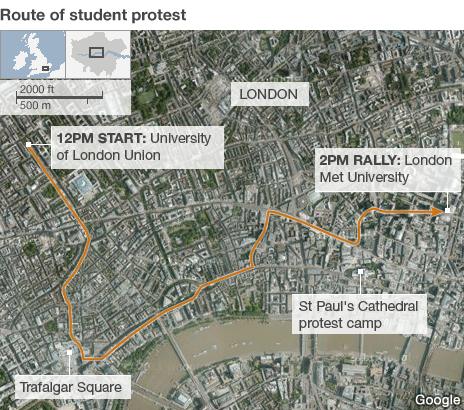Thousands march in student protest over university fees
- Published
Students march through central London to protest against rises in tuition fees and changes to higher education.
The police were out in force as thousands of students marched through central London.
Some 4,000 officers were on duty, as demonstrators marched peacefully in a protest against higher tuition fees and "privatisation" in universities.
After the violence of last year's major fees protest, the police had warned they might use plastic bullets in "extreme circumstances".
Police said 24 people were arrested, mostly for breaches of the peace.
Police estimate there were about 2,000 protesters, but organisers put the number attending at 15,000.
Scotland Yard said three arrests were for public order offences, one was for possession of an offensive weapon, three were for going equipped and 12 breaches of the peace.
At lunchtime, some protesters broke away from the march and set up tents in Trafalgar Square, but were eventually moved on.
The crowd marched to the City of London, where a protest against corporate greed has been taking place outside St Paul's Cathedral.
Financial district
BBC correspondent Mike Sergeant was with the protesters as they neared St Paul's and the City.
"The march is moving slowly, sedately even. It is quite extraordinary the way it's being policed," he said.
"It's the most tightly controlled march through London that I have ever seen. Very little opportunity for protesters to break away - an enormous contrast to last year."
The student protest, organised by the National Campaign Against Fees and Cuts, is against the government's plans for a market-driven higher education system and the rising tuition fees.
"We are being told by a cabinet of millionaires that we will have to pay triple tuition fees," said campaign leader Michael Chessum.
Student protest organiser, Michael Chessum: "Police intimidation is unacceptable and irresponsible"
As a warning against any outbreaks of violence, a spokesman for the Metropolitan Police had said that one of the tactics available was "the authority to deploy baton rounds [plastic bullets] in extreme circumstances".
As police and news helicopters hovered overhead, thousands of protesters set off from Malet Street in London's university district.
Protesters carried placards which read "Scrap Tuition Fees" and "Free Education" and chanted "No ifs, no buts, no education cuts" and slogans criticising the police over rubber bullets.
They then marched through the capital.
BBC Education Correspondent Sean Coughlan is at the demonstration. At 1325, he said: "Chanting student protesters are going through London's Theatreland, lots of noise, lots of cameras and lots of police. It feels less predictable than last year's protests, but so far no trouble."
As the demonstration moved through Trafalgar Square, some protesters broke away from the march.
They set up about 20 pop-up tents at the base of Nelson's column, but were later moved on by the police.
The police had said they would arrest those who refused to move, on the grounds that they had broken away from the authorised route of the march.
Earlier, one of the campaigners, Glynn, told BBC News he had come from another camp in London's Finsbury Park, to protest against a "corrupt government" which was fuelled by "corrupt money and bankers".
As dusk fell, a few hundred protesters continued their demonstration at the end point of the march, London Wall.
The rally is being supported by the National Union of Students, but it is not being organised by them.
Much of the anger is over tuition fees, which are set to rise to a maximum of £9,000 a year at England's universities next year.
Universities in Wales are also raising their fees up to to that maximum level from autumn 2012 - but only for students from outside Wales.
In Scotland, Scottish students will continue to pay no fees, but fees of up to £9,000 a year will be charged to students from other parts of the UK.
Daisy Robinson, a London student, is among the marchers.
"It is just not fair, education should be available to everyone," she said.
Annette Webb, studying at Portsmouth University, said: "I was against it when they raised fees from £1,000 to £3,000, but to go up to £9,000 will price out most students.
"It will mean that education is only for the rich and I believe it should be for everyone."
James Dodge, 22, from Ashford, Kent, said: "I like to exercise my free right to protest, even when it is being curtailed by the Metropolitan Police."
Universities Minister David Willetts said: "We are putting students at the heart of the system, with a diverse range of providers offering high-quality teaching. Going to university depends on ability not the ability to pay.

"Most new students will not pay upfront, there will be more financial support for those from poorer families and everyone will make lower loan repayments than they do now once they are in well paid jobs.
"Students, like other citizens, have the right to participate in peaceful protest."Police in force at student march
Competition a 'fact of life'
Paul Clark, director of policy at Universities UK, which represents higher education institutions, says universities will not be damaged by increased competition.
"I think that the level of private involvement in higher education at the moment is relatively small and is likely to remain that way for the foreseeable future although we know there are plans to, to change this," he said.
"But we also know that competition is a fact of life for universities. They compete for part-time students; post-graduate students for research funding and for international students. So this is not something that we should necessarily be afraid of, as a sector."
- Published7 November 2011
- Published9 November 2011
- Published9 November 2011
- Published8 September 2011
- Published28 June 2011